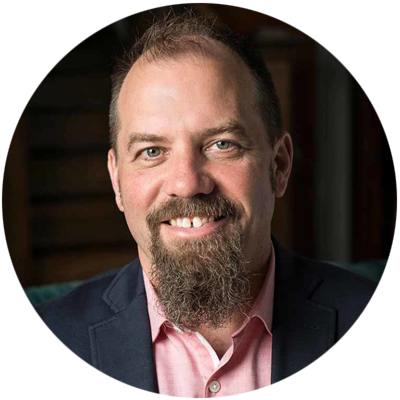Caleb Maskell: There’s a sense in which the picture of a human being as lover resonates deeply with some of the intuitive practices that we have in the Vineyard. For example, we’ve always prioritized worship, particularly worship songs directed toward God that express love to him, for who God is and what Jesus has done. It’s the idea that love draws us forward, but we’re also met with love. It’s the connection of our love with God’s love in terms of being pulled towards the future that’s not here yet, but is coming.
James K. A. Smith: Absolutely. I see this intuition that we are lovers implicitly operative in Vineyard appreciation for the affections. People can sometimes criticize what looks like a kind of romanticism of worship. But to me, it’s a signal that the Vineyard recognizes that God is the Great Seducer. God is not pushing us; God is pulling us. God is drawing us. God is attracting us. I see Vineyard worship honoring the dynamics of that lure, that draw, that wooing, in some sense.
CM: I have seen something interesting emerging lately. I think a lot of worship leaders in the Vineyard and similar movement who have valued that “affectional” aspect of worship have been struggling in some ways with the converse, which is that worship songs also put words in people’s mouths about what we believe about God. The expression of affections needs to be very well articulated—because it essentially distills what we believe! So I love the idea that beliefs are shorthand forms of practices. The songs we sing and things we do in our churches are intended to give a microcosm of what the larger picture is supposed to look like.
JS: Yes, and I also think you want room for a sort of feedback loop. When we go through the exercise of articulating our beliefs, that articulation can also be the basis for a critique of our practices. So we need to keep our practices in account. For example, our worship shouldn’t slide off into emotivism or the “Jesus is my boyfriend” kind of thing. Critical reflection and articulation can serve the practices.
CM: In Desiring the Kingdom, you talk about the best account of human beings being driven by love. You then spend a lot of time reflecting on this idea that human beings are formed by things that draw their love out. Could you explain how you’ve been thinking about formation and the way that church practices play into that?
JS: To make the core claim that human beings are lovers and that we’re defined by what we love is really only the beginning of this package. Then the question is, “How do I come to love what I love?”
[perfectpullquote align=”right” bordertop=”false” cite=”” link=”” color=”” class=”” size=””]Your love is much more like a habit than a decision.[/perfectpullquote]
The tradition and work I’ve drawn upon emphasizes that your love is much more like a habit than a decision. It is a fundamental orientation that you acquire, but it is a product of a process that philosophers call “habituation.” That is, that you are trained to love. It’s a bit complicated for charismatics, but it’s not the case that there is just some magic event that stimulates love to the right track and then you’re all set. I think we all know this just doesn’t work.
Your heart is the fulcrum of your love, and the heart is subject to training and to formation. The way our hearts get trained is through immersion in practices, rituals and routines and rhythms that, over time, inscribe the right disposition within us. These practices orient us so that we are becoming the kind of people trained to the goal of loving well. It doesn’t have to be mystifying. It’s similar to how we learn to play the violin or how to drive. Historically these practices are called spiritual disciplines; they habituate our love over time so that we become those kinds of people.
CM: Now, is this similar to what someone like Dallas Willard would say about the spiritual disciplines and formation of the heart?
JS: Absolutely; there are tons of overlap. The difference that I try to amplify in Desiring the Kingdom is that Dallas still tends to paint a picture of spiritual disciplines that maybe doesn’t have quite the centrality of gathered Christian worship about it. My emphasis is on the practice of gathered Christian worship as the hub for that formation. All of our other spiritual disciplines spiral out of that hub and live off the energy and formative power of the centrality of the Church. You need the Church to pull off spiritual discipline.
CM: What it is about the Church in particular that makes it the hub of formation?
JS: One, I think that gathered Christian worship is the hot spot of the Spirit; I think it should be sacramental. By that, I mean the Spirit is most powerfully present in what we receive as the sacraments, and what the Church over time has discerned as core worship practices.
So if you want to be formed by the Spirit and sanctified by what the Church over history has said, then you immerse yourself in these practices: the Eucharist, the Lord’s Supper, the Word, and baptism. One of the reasons ecclesial worship is essential is because of its sacramental character.
Secondly, for me, the core of the practices of Christian worship are catholic – not that they are Roman Catholic, but that they are the common inheritance of the people of God, over history, led by the Spirit. In that process, the Church together has discerned a kind of form or shape of Christian worship that the Spirit works in.
The entire narrative of what God is doing through Christ is re-narrated every week in catholic Christian worship practices. So catholicity, to me, simply means inheriting a core commitment to certain components of Christian worship that have their own logic about them. They are liturgies. They tell the story of the Gospel over and over. In doing that, they initiate us into the story. What worries me is, if you don’t appreciate that catholic heritage of worship, I worry that you lose components of the story. Then you lose certain opportunities for formation and counter-formation to the secular liturgies we are immersed in.
The full interview with James K. A. Smith was published in Cutting Edge Magazine, Vol. 15 No. 2. If you’d like to read more, download the issue here.

Caleb Maskell leads the Society of Vineyard Scholars and is the Worship Pastor at Blue Route Vineyard Community Church. He is currently finishing his PhD in the Department of Religion at Princeton University, focusing on the history of American Christianity. He has taught at Princeton Theological Seminary and Fordham University. In 2007, he co-planted Elm City Vineyard Church in New Haven, Connecticut with his wife Kathy.

James K. A. Smith is professor of philosophy at Calvin College, where he holds the Gary and Henrietta Byker Chair in Applied Reformed Theology and Worldview. He is author of many books, including the prizewinning Desiring The Kingdom: Worship, Worldview, and Cultural Formation and Thinking In Tongues: Pentecostal Contributions to Christian Philosophy. He was a plenary speaker at the 2011 Society of Vineyard Scholars conference.





